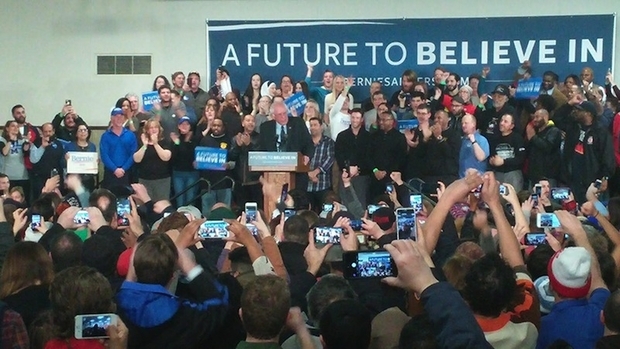Sanders on the Middle East: A refreshing departure from US mainstream policy

In an interview with the website the Intercept on September 21, US Senator Bernie Sanders, the country's most popular politician, called for a major transformation of US foreign policy in the Middle East. Sanders criticised the cozy relationship the US has conducted with Saudi Arabia and called it a source of terror in the region and the world. He also said that the US should re-examine the $3bn in military aid provided to Israel every year.
No president or even presidential candidate has offered US help to rebuilt Gaza after the multiple wars Israel waged against it
These are radical statements considering the conservatism of previous national policy. They are radical not just for the US foreign policy establishment, but for Sanders himself. Previously, he had defended Israel even in the face of charges that it engaged in war crimes during the 2014 Gaza war. While Sanders did offer some criticism of Israel during the presidential debates with Hillary Clinton, it was quite mild.
Frankly, Sanders is most known as a domestic policy wonk. He champions a single-payer health plan, free college education for American youth, and other policies promoting equity and social justice within the US. Foreign policy has been much less prominent in his public statements and political platform. So this interview marked a breaking of new ground for the former (and perhaps future) presidential candidate.
A radical change
Despite Sanders' own description of himself as a democratic socialist, he is after all still a mainstream candidate. It would be foolish to expect him to adopt a truly radical perspective on MENA issues considering how cautious and conservative US policy has been for decades.
Similarly, Sanders is clearly a liberal Zionist, rather than progressive. He opposes the Boycott, Divestment, Sanctions (BDS) movement and has not announced his opposition to the free speech killer, the Israel Anti-Boycott Act, which would prohibit US companies from endorsing the pro-Palestinian movement to boycott Israeli Occupation.
He also signed a letter promoted by the Israel Lobby that denounced the UN for alleged "anti-Israel bias". He, later backpedalled claiming he hadn't written the letter nor would have, while acknowledging he did sign it.
Sanders has spoken before the liberal Zionist group, J Street. But he has not addressed the far more progressive Jewish Voice for Peace, which has endorsed BDS. During the campaign, he fired Jewish community liaison Simone Zimmerman for espousing critical views on Israel on social media.
Recently, he hired Matt Duss as his foreign policy expert. Duss is a liberal think tank veteran who has attacked BDS, saying some of its adherents are "anti-Semitic". Sanders has also shown animosity toward left-wing journalists whose opinions are more progressive than his own. It’s unclear how radical a break Duss would pursue in a Sanders administration given his timid, incremental approach on Israel-Palestine issues.
Despite this, the glass is not half-empty regarding Sanders views but rather half-full. For example, he conceded in the Intercept interview that the US was "complicit" in the Israeli occupation by providing weapons and aid to Israel to maintain it. But even in doing so and making quite a radical statement below, he couches it in carefully calibrated language meant to conceal how radical his stance is:
Asked if he would consider voting to reduce US aid to Israel - worth at least $3bn per annum - or US arms sales to the Israeli military, he replied:
"The US funding plays a very important role, and I would love to see people in the Middle East sit down with the United States government and figure out how US aid can bring people together, not just result in an arms war in that area. So, I think there is extraordinary potential for the United States to help the Palestinian people rebuild Gaza and other areas. At the same time, demand that Israel, in their own interests in a way, work with other countries on environmental issues.” He then, finally, answers my question: “So the answer is yes.”
If you examine this passage closely, you'll find several refreshing departures from mainstream US policy. No president, or even presidential candidate, has offered US help to rebuild Gaza after the multiple wars Israel waged against it. The fact that Sanders is willing to affirm this is meaningful not just on its own terms, but because US engagement in Gaza would force it to take a more assertive position regarding future Israeli attacks against the enclave. We would have more to lose because Israel would be destroying projects built with US funding.
Sanders wants the United States to pivot away from blind, uncritical support for Saudi Arabia. He even seems to suggest that the United States should embrace the Saudis' mortal enemy: the Iranians.
The most obvious divergence in the above passage is Sanders' flat-out endorsement of reconsidering US military aid to Israel. This is a position that has been on the farthest left margins of US foreign policy for decades. Sanders' endorsement, even a cautious one, marks a radical change. It could have far-reaching impact within the Democratic Party as well, which has moved haltingly leftward on the Israel-Palestine question over the years.
Dim views on the Saudis
The US senator takes an extremely dim view of the Saudis."It is not just that many of the 9/11 bombers came from Saudi Arabia," he says, "what I think is more significant is their … continuing to fund madrasas and to spread an extremely radical Wahhabi doctrine in many countries around the world. And they are funding these mosques, they're funding the madrasas, and they are fomenting a lot of hatred."
Sanders wants the United States to pivot away from blind, uncritical support for Saudi Arabia. He even seems to suggest that the United States should embrace the Saudis' mortal enemy: the Iranians. "Do I consider them [the Saudis] an ally? I consider them to be an undemocratic country that has supported terrorism around the world. It has funded terrorism, so I can't … No, they are not an ally of the United States."
Since the end of WWII, US presidents have cozied up the House of Saud, both for its oil resources and as a bulwark against the more extreme forms of Arab nationalism represented by figures like Gamal Abdul Nasser and the so-called Islamist "threat", more recently, of the Muslim Brotherhood.
Former US president George W Bush, looked the other way in the aftermath of 9/11 because the Saudi regime sweet-talked him into believing they weren’t responsible for their own citizens perpetrating this domestic terror attack, and because he needed Saudi support for US invasions of Afghanistan and Iraq.
Sanders is the first presidential aspirant who seems willing to take a completely independent approach. As further proof of this, Sanders also spoke in highly positive terms about Iran, Saudi Arabia’s sworn regional rival.
“I think that one of the areas that we have got to rethink, in terms of American foreign policy, is our position vis-a-vis Iran and Saudi Arabia,” he said. “For whatever reason - and I think we know some of the reasons having to do with a three-letter word called oil - the United States has kind of looked aside at the fact that Saudi Arabia is an incredibly anti-democratic country and has played a very bad role internationally, but we have sided with them time and time and time again, and yet Iran, which just held elections, Iran whose young people really want to reach out to the West, we are....continuing to put them down."
In the foreign policy speech Sanders delivered the day after doing the interview, he also doubled down on the Iran's nuclear deal, saying it must be protected in the face of opposition from President Trump and the GOP Congress.
Embrace diplomacy
The main thrust of Sanders' foreign policy approach is to eschew military conflict and embrace diplomacy as a means of resolving international conflicts. He also attacked the unilateralism of past GOP presidential administrations and affirmed the importance of consulting allies and being open to their own foreign policy ideas. The former Democratic presidential candidate criticised current US counter-terror strategy:
“I think you best deal with terrorism by trying to understand the root causes of those problems: the massive poverty that exists, the lack of education that exists, that when you drop a drone, for example, that kills innocent men, women, and child, that it only forms more antagonism toward the United States.”
Sanders also said that the killing of innocent civilians creates far more enemies than it eliminates; and that the US needs to understand and address the causes of extremism in a proactive manner, rather than the reactive one we currently use.
These are ideas that used to be commonplace as US policy. Former President Barack Obama, at least at the optimistic beginning of his first term, mined the same themes. However, he quickly eschewed them in the face of pressure to get quick results in the "war on terror" that resulted in short-term "benefits" like the assassination of Osama bin Laden. But it led to his abandonment of the constructive engagement approach he espoused in his famous 2009 Cairo speech.
Of course, it’s hard to know whether a President Sanders would implement the policies he’s now espousing. But it seems clear that his commitment is sincere and not as easily shaken as Obama's.
- Richard Silverstein writes the Tikun Olam blog, devoted to exposing the excesses of the Israeli national security state. His work has appeared in Haaretz, the Forward, the Seattle Times and the Los Angeles Times. He contributed to the essay collection devoted to the 2006 Lebanon war, A Time to Speak Out (Verso) and has another essay in the upcoming collection, Israel and Palestine: Alternate Perspectives on Statehood (Rowman & Littlefield).
The views expressed in this article belong to the author and do not necessarily reflect the editorial policy of Middle East Eye.
Photo: Bernie Sanders during 2016 election campaign (AFP)
Photo: Sanders speaks to supporters at a rally in Dearborn (MEE/Ali Harb)
Middle East Eye propose une couverture et une analyse indépendantes et incomparables du Moyen-Orient, de l’Afrique du Nord et d’autres régions du monde. Pour en savoir plus sur la reprise de ce contenu et les frais qui s’appliquent, veuillez remplir ce formulaire [en anglais]. Pour en savoir plus sur MEE, cliquez ici [en anglais].





